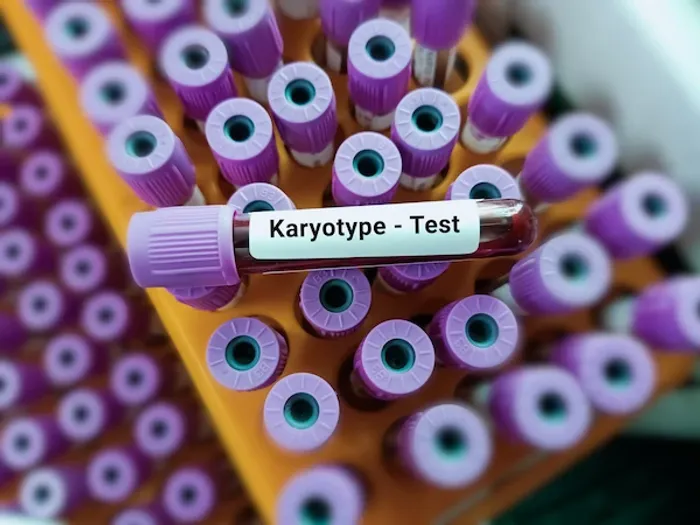Karyotype Test Overview and Procedure
Learn about the karyotype test, its purpose, procedure, and role in detecting genetic abnormalities and chromosomal disorders for accurate diagnosis and treatment planning.


If you or a loved one has been advised to take a karyotype test, you might have questions about what it is, why it’s needed, and what to expect. This guide will help you understand the basics in simple terms so you can feel more informed and at ease.
What Is a Karyotype Test?
A karyotype test is a type of genetic test that examines your chromosomes, the thread-like structures inside your cells that carry your genes. These chromosomes determine everything from your eye color to how your body grows and functions.
The test checks for:
- Number of chromosomes (humans typically have 46, arranged in 23 pairs).
- Size and shape of chromosomes.
- Any missing, extra, or rearranged chromosomes.
This helps doctors diagnose genetic disorders, fertility issues, or developmental problems.
Consult a Top Geneticist
Why Is a Karyotype Test Done?
A doctor may recommend a karyotype test for various reasons, including:
1. Diagnosing Genetic Disorders
- Some conditions, like Down syndrome (extra chromosome 21), Turner syndrome (missing X chromosome in females), or Klinefelter syndrome (extra X chromosome in males), can be detected through this test.
2. Fertility and Pregnancy Concerns
- Recurrent miscarriages (to check for chromosomal abnormalities).
- Infertility issues (to see if there’s a genetic cause).
- Prenatal testing (if there’s a risk of genetic disorders in the baby).
3. Unexplained Developmental Delays
- If a child has delayed growth, learning difficulties, or unusual physical features, a karyotype test can help identify a possible genetic cause.
4. Certain Cancers
- Some blood cancers (like leukemia) may involve chromosome changes that this test can detect.
How Is the Test Done?
The procedure is simple and involves taking a small sample of cells. Here’s what happens:
1. Sample Collection
- Blood Test (Most Common): A small blood sample is taken from a vein in your arm.
- Bone Marrow or Tissue Sample: Sometimes needed for cancer-related testing.
- Amniocentesis (For Prenatal Testing): A small amount of amniotic fluid is taken from the womb.
- Chorionic Villus Sampling (CVS): A tiny piece of placenta is tested during early pregnancy.
2. Lab Processing
The cells are grown in a lab, stained, and photographed under a microscope. A genetic specialist examines the chromosomes to check for abnormalities.
3. Results
- Results usually take 1-2 weeks (longer for prenatal tests). Your doctor will explain the findings and discuss next steps if needed.
Get Your Health Assessed
How to Prepare for the Test?
- No special preparation is needed for a blood test.
- For prenatal tests, follow your doctor’s instructions carefully.
- Stay relaxed as most people experience minimal discomfort.
Does the Test Hurt?
Most people feel only a slight pinch during a blood draw. Prenatal tests (like amniocentesis) may cause mild discomfort but are generally safe when performed by a specialist.
What Do Abnormal Results Mean?
If the test shows extra, missing, or rearranged chromosomes, your doctor will explain the condition and its implications. Some genetic disorders can be managed with early intervention, therapy, or medical care.
When to Consult a Doctor?
If you or your child has:
- Unexplained developmental delays
- Multiple miscarriages
- Signs of a genetic disorder
- A family history of chromosomal conditions
…a karyotype test might be recommended.
Can I Book a Karyotype Test Online?
Yes! If your doctor suggests this test, you can easily schedule a karyotype test through Apollo 24|7. Their expert genetic counselors and labs ensure accurate and timely results.
Final Thoughts
A karyotype test is a powerful tool to understand genetic health. If recommended, don’t worry, it’s a straightforward procedure that provides valuable insights. Always discuss your concerns with your doctor, who can guide you based on your specific needs.
Consult a Top Geneticist
Consult a Top Geneticist

Dr. Mohammed Kamran
General Practitioner
5 Years • MBBS, FIDM
Nashik
Apollo 24|7 Clinic - Maharashtra, Nashik

Dr. Jawwad Mohammed Kaleem
General Practitioner
4 Years • MBBS
Hyderabad
Apollo 24|7 Clinic, Hyderabad

Dr. M L Ezhilarasan
General Practitioner
6 Years • MBBS
Visakhapatnam
Apollo 24|7 Clinic - Andhra Pradesh, Visakhapatnam

Dr. Chaithra H
General Physician/ Internal Medicine Specialist
6 Years • MBBS, MD General Medicine, DNB General Medicine
Bangalore
Apollo 24|7 Clinic - Karnataka, Bangalore

Dr D M Karthik
General Practitioner
4 Years • MBBS, Fellowship in Diabetes Mellitus, Advance certificate in Diabetes Mellitus, Derma Nutrition Certification
Visakhapatnam
Apollo 24|7 Clinic - Andhra Pradesh, Visakhapatnam
Consult a Top Geneticist

Dr. Mohammed Kamran
General Practitioner
5 Years • MBBS, FIDM
Nashik
Apollo 24|7 Clinic - Maharashtra, Nashik

Dr. Jawwad Mohammed Kaleem
General Practitioner
4 Years • MBBS
Hyderabad
Apollo 24|7 Clinic, Hyderabad

Dr. M L Ezhilarasan
General Practitioner
6 Years • MBBS
Visakhapatnam
Apollo 24|7 Clinic - Andhra Pradesh, Visakhapatnam

Dr. Chaithra H
General Physician/ Internal Medicine Specialist
6 Years • MBBS, MD General Medicine, DNB General Medicine
Bangalore
Apollo 24|7 Clinic - Karnataka, Bangalore

Dr D M Karthik
General Practitioner
4 Years • MBBS, Fellowship in Diabetes Mellitus, Advance certificate in Diabetes Mellitus, Derma Nutrition Certification
Visakhapatnam
Apollo 24|7 Clinic - Andhra Pradesh, Visakhapatnam
